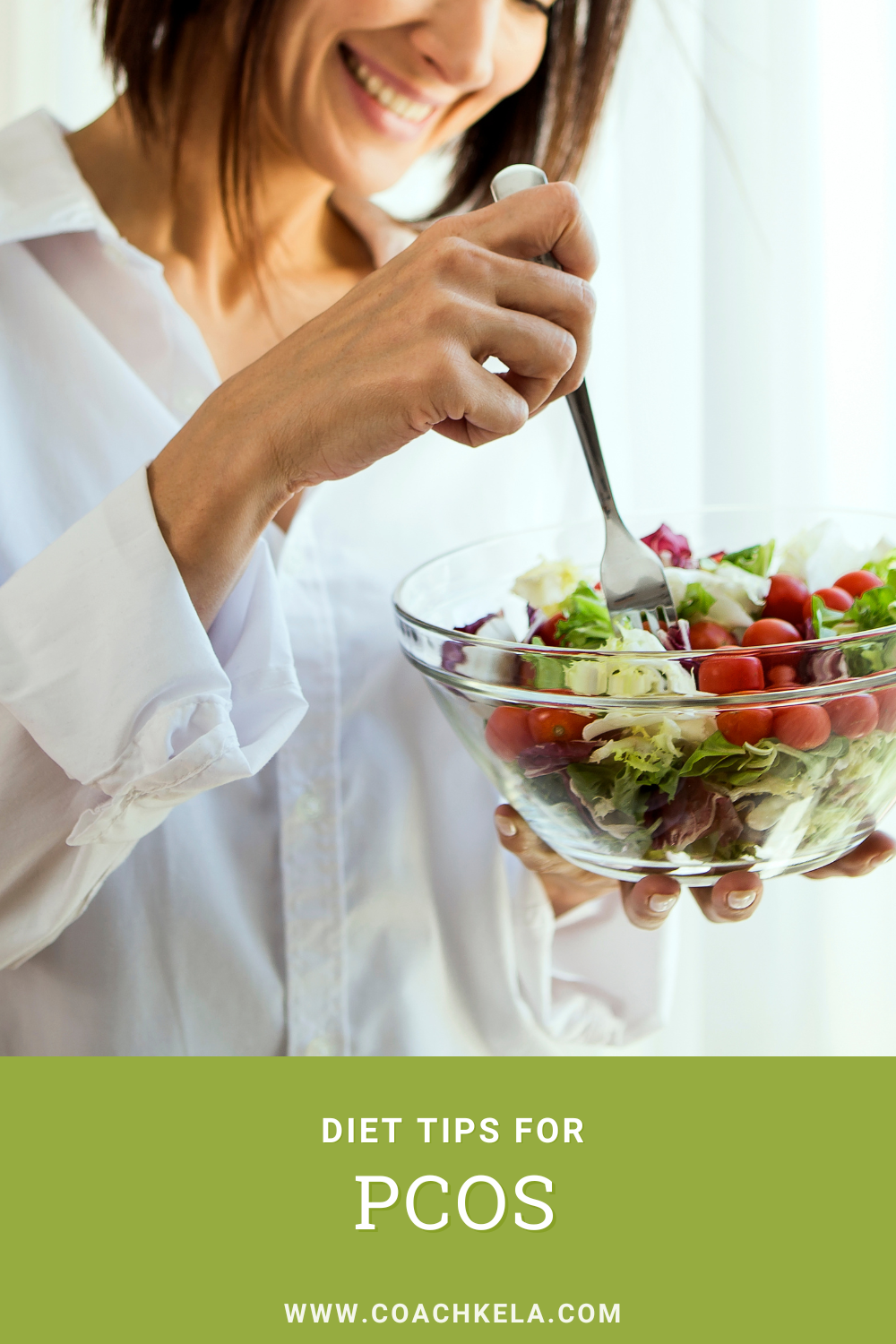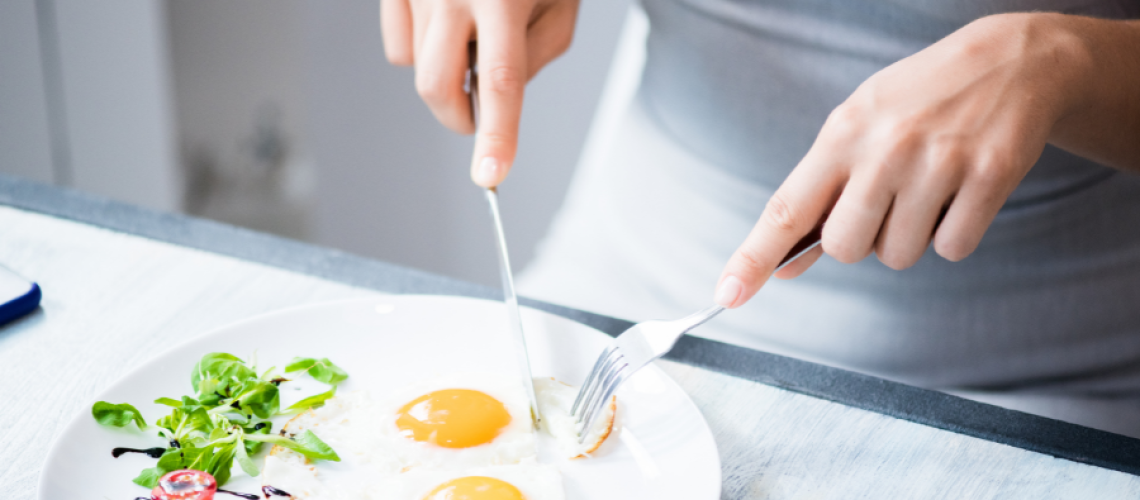Written by Guest Blogger: Dora Toma, a Functional Medicine Health Coach.
I want to start this blog by sharing some facts with you related to diet and PCOS:
No diet is the perfect diet for everyone
Either you heard on a group, podcast, or blog that going on a Ketogenic diet is the best dietary approach for managing PCOS.
Or maybe you’ve heard about a low carb diet, or a vegan diet, or whatever diet is trendy at this moment.
Don’t get me wrong, I’m not against any of them if they actually are done right and if the person feels at it’s best.
Although there are many women who swear on them, many women who are trying they epically fail, feel worse than before, and find that it’s hard to maintain.
That’s because everybody is unique and not everyone is designed to thrive on these extreme diets.

But there are some basic rules that everyone should follow, because that will build the foundation of a healthy body. Everything else are just fine tuning that each individual needs to explore in its own.
These foundational rules are:
ALWAYS pair your carbohydrates with protein and fat
Carbohydrates are the major source of energy for the body. Once they get in the gut they are broken down in simple sugars where they get transported by the blood to all the organs.
Blood sugar rises and then falls when you eat a meal containing carbs. How high it rises and how long it remains high depends on the kind of carbs and the amount you ate in comparison with the proteins and fats.
When you eat a meal with carbohydrates, your pancreas produces insulin to transport all that sugar from the blood to the cells, fat tissue, and liver. If there is too much sugar in the bloodstream for too long that creates inflammation and that’s not good.
In women with PCOS insulin resistance is very common. This is when your cells are not responsive to insulin so your blood sugar remains elevated, the body becomes inflamed, the sugar ends up in the fat tissue (that’s when you start seeing weight gain) and liver, and more issues start to add up.
By eating a balanced diet where you pair your carbohydrates with adequate protein and fat your blood sugar won’t spike too much, your insulin will be able to catch up with it and your cells will be more responsive.
Sugar should never be added
Like I was mentioning earlier, managing your blood sugar is one of the key components with PCOS.
Any type of sugar that is not part of a fruit or vegetable should be consumed to the minimum.
I know it’s hard to quit that Caramel Macchiato or donut but keep in mind that added sugar is processed (with the exception of honey or pure maple syrup) which means it takes for the body less time to break it down so you will get that high insulin spike.
If you want to have an occasional desert, my advise is to eat it in the morning. That’s when your insulin and your insulin sensitivity are already high and your body is best adapted to handle a high-sugar, high-fat treat.
Have more plants and less meat
Before I start I want to get things straight: Meat is not bad, but quality bad meat is.
Meat is a good source of protein, essential vitamins like B-complex, vitamin A, vitamin D, DHA, but also minerals like iron and zinc.
Unfortunately there are too many processed meats or antibiotic treated meats on the market and grass-fed or pasture raised meats are harder to find and more expensive.
Plants though are more accessible, high in vitamins, minerals, and antioxidants that will help the body work optimally, fight any inflammation, lower insulin levels, balance hormones, and make you feel at your best.
Plants should always take the majority of space in your plate, with some fat and as a side a piece of animal protein.
Eat a diet rich in fiber
Fiber helps in two ways with PCOS:
- By slowing down the digestion of sugars in the body, so there is no spike in insulin
- By promoting healthy estrogen metabolism which aids in the reduction of elevated levels of androgens
The greatest source of fiber are fruits and vegetables, chia seeds, flax seeds, and all nuts and seeds.
Grain and whole grains have some fiber but comparing with the amount of carbohydrates that’s not enough to keep the blood sugar under control.
Processed food is not real food
Nothing that comes out of a package should be considered food. Even if it says that it has I don’t know how many vegetables.
That’s because during the processing of real foods like vegetables and fruits they loose all their nutritional value.
There are two types of malnourishment:
- Caloric, when you don’t eat enough calories
- Nutrient, when you don’t eat enough nutrients
In the western world the caloric malnourishment is almost inexistent but what’s more prevalent is the nutrient malnourishment.
Processed foods are also highly inflammatory, include ingredients that not only you cannot pronounce but neither your body can identify.
Another issue with processed foods is that they are high in processed sugars, which will add to the cascade of inflammatory compounds.
Dairy and gluten are highly inflammatory foods that may worsen acne
Milk is the food that the cow makes for her calf. If is full of nutrients and hormones that the calf needs to grow big and strong. Women with PCOS already have hormonal irregularities…so guess what you don’t need? Some cow’s hormones.
Dairy also makes your body extra responsive to all that testosterone, which leads ti skin oil overproduction, inflammation, and an altered skin microbiome that can trigger horrible cystic acne.
Gluten is a protein found in wheat, barley, rye, and products made from those grains like pasta, cereals, crackers, breads, and other baked goods. It’s also found on soy sauce, salad dressings, soups, candy bars, French fries, beer, and so much more!
If you are following a whole food diet where you avoid processed foods (so anything that comes in a package and has an ingredient list) then by default you will cut gluten from your diet.
The problem with it is that many people do not tolerate it well. And even for people who seem okay, gluten contributes to leaky gut, which then causes inflammation and increases your susceptibility to autoimmune diseases, allergies, diabetes, etc.
If you follow these steps, I guarantee you that you’ll never feel hungry after two hours, you will never crash in the afternoon, you will feen more energized than ever and your body will thank you by giving you back your period.
Guest Blogger,
Dora Toma
FREE: 7 Tips to Optimize your Fertility
Dora is a Functional Medicine Health Coach specialized in women’s health and fertility. It all started with her own health journey in managing PCOS, then going through a difficult pregnancy that lead to premature labor and loss. That’s when she has decided to learn all about how she can help the body reach optimal fertility. All these efforts have paid out and she was able to have a healthy pregnancy and the birth that she wanted in 2020.
Seeing the need for support with her own eyes, when it comes to this fertility journey, she became a subject matter expert for other women who are going through similar challenges.
Her favorite activities are hiking, reading and yoga.
While working with her clients, she utilizes her health coaching skills to find unique and bespoke methods that work for each unique individual, no matter of their eating and lifestyle history.
P.S. Catch Dora’s interview in this week’s episode of The Hormone P.U.Z.Z.L.E Podcast – Top Tips From a Functional Medicine Health Coach. You can also find the episode on this podcast page as well as Spotify, and Stitcher. Don’t forget to subscribe, follow, and write us a review on Apple Podcast (if you LOVE it).



